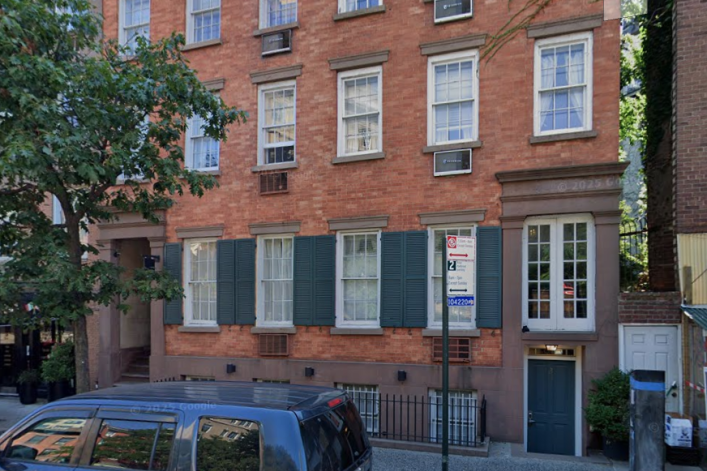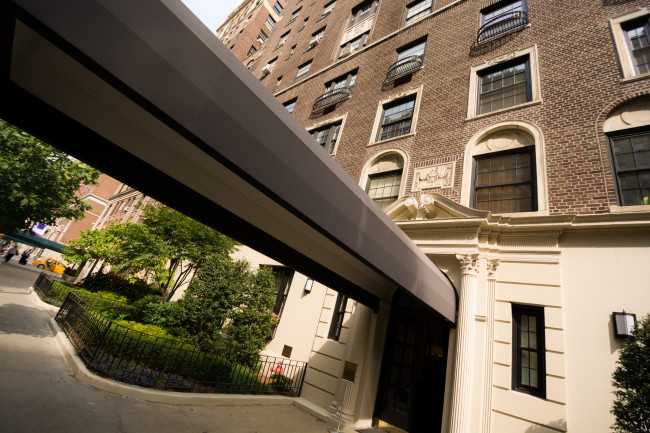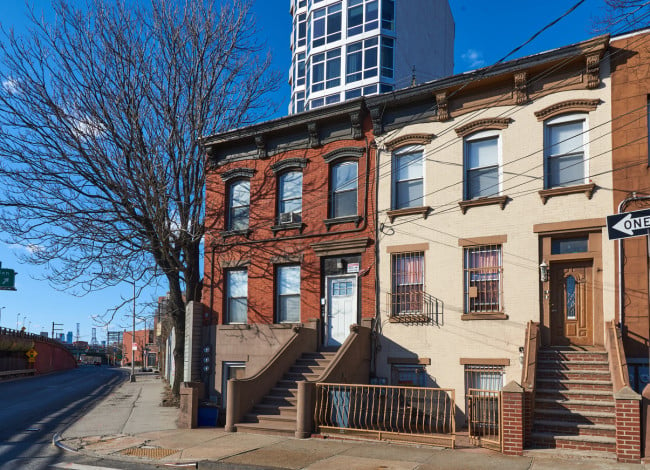NYC files first lawsuit under Local Law 18 against owners of West Village inn
- The suit claims 12 apartments in a pair of townhouses are illegal short-term rentals
- NYC argues the properties are residential and can be used only for stays of 30 days or more

The city’s lawsuit says the apartments at 30 and 32 Eighth Ave. are not registered as short-term rentals and violate the city’s rules on short-term stays.
Google Maps
In its first lawsuit using Local Law 18, New York City’s Office of Special Enforcement alleges 12 apartments in a pair of West Village townhouses are being used illegally as short-term rentals.
According to the lawsuit, Incentra Village House—which also goes by the name Incentra Village Guest House and Incentra Village Hotel—advertised short-term stays on sites like Airbnb, Booking.com, Expedia Group/VRBO, and TripAdvisor-affiliated sites as well as its own website. A search by Brick Underground found listings starting at around $300 a night.
Incentra’s website describes the townhouses at 30 and 32 Eighth Ave. as an “historic inn was built in 1841 [that] occupies two brick landmark townhouses in New York City's Greenwich Village Historic District.” The description says there are 12 rooms—ranging from studios to three-bedroom suites but only 11 rooms appear available, like the Dakota Room, a renovated studio with a private bath and kitchenette; or the Stable Room, a studio that occupies the property's original 1800s-era stable.
Incentra was named by Lonely Planet as the first gay inn in Manhattan, and Incentra's website notes the hotel's location in the West Village is “the traditional center of gay life in New York City. With much of the area land-marked for historic preservation, the quaint atmosphere is of the early [19th] century.”
Missing room from the list of available rooms is the Stonewall Room, a nod to the riots that catalyzed the gay-rights movement. It is located in the basement and the lawsuit cites a guest’s review of a stay in this room “[two] flights down narrow[,] rickety stairs to a sub-basement with no window. Ceiling was so low in spots that my husband who is 6 feet tall hit his head several times.”
Another review cited by the lawsuit noted the cellar room had “no means of escape, should anything happen.”
In another, a guest described being unable to reach the front desk or management when they needed assistance: “Nobody answers the main phone line for Incentra. [S]o we used an ‘emergency only’ number that we had been given for a manager/owner(?) who supposedly lived around the corner. However, nobody answered that number either[.]”
On May 6th, according to the suit, a guest posted a review on TripAdvisor with a photo of the city’s vacate order on the front door. The guest expressed concern about the vacate order, and noted that the room they stayed in “is in a serious state of disrepair…Everything is so worn down, broken, frayed- dirty.”
Putting teeth into short-term rental rules
In 2022, NYC passed Local Law 18, also known as the Short-Term Rental Registration law. It requires owners and renters to register their short-term rentals with the Mayor’s Office of Special Enforcement (OSE) and the law is designed to reinforce the city’s existing rules for short-term rentals: Owners or renters cannot rent out an entire apartment for fewer than 30 days, even if the host owns or lives in the building.
Hosts who successfully register their short-term rentals receive a registration number to display in online listings. Sites such as Airbnb, VRBO, Booking.com, and others are prohibited from posting listings for unregistered short-term rentals. Both hosts and listing sites that break the rules can be penalized. Fines for hosts can go as high as $5,000 and platforms can face penalties of $1,500.
What the lawsuit claims
The city’s lawsuit says the apartments in the West Village townhouses are not registered as short-term rentals and violate the city’s rules on short-term stays.
As the plaintiff, NYC said it spent two years and involved at least three city agencies to determine the buildings can be used on a residential basis only for stays of 30 consecutive days or more. The lawsuit said the city also encouraged the owners to come into compliance “without enforcement actions” but defendants “have repeatedly chosen litigation and have refused to stop their illegal and unsafe rental operation.
According to the suit, in March 2023, one of the owners who is shielded behind an LLC known as Jane 8 applied for the buildings to be added to OSE’s Class B Multiple Dwelling List. This exempts buildings from short-term rental registration. Jane 8 has claimed its short-term rental operation is legal because the COs were issued before Dec. 15th, 1961.
The application was denied and Jane 8 followed up with an appeal, and was granted temporary injunctive relief while that appeal was pending. Jane 8 reached out to online platforms to inform them of the injunction to keep Incentra listings active, the suit said.
In early January, NYC’s Board of Standards and Appeals upheld the DOB’s denial and clarified that the buildings are not Class B multiple dwellings. The injunction expired, however the owners continue to operate their short-term rentals.
Later in the month, the city inspected the buildings and issued 11 summons for illegal short-term occupancy as well as safety violations including an inadequate fire alarm system, an inadequate fire sprinkler system, and a failure to provide the required number of exits.
Multiple violations were issued for the basement Stonewall Room and it was ordered to remain vacant.
OSE said it contacted the attorney for Jane 8 LLC to determine “whether it would now come into compliance and prevent the need for further enforcement, but counsel again advised that it would not comply.” (An attorney for the owners did not respond to a request for comment from Brick.)
The city is seeking a judgement against the owners to permanently prevent them from using the buildings for short-term occupancy and wants them to pay several penalties, including fines of $5,000 or three times the revenue generated by each unregistered rental—whichever is less.
NYC’s housing crisis
The lawsuit, like Local Law 18, is a response to the city’s housing crisis.
"With a vacancy rate of a mere 1.4 percent New York City cannot afford to have housing units siphoned off for illegal short-term rentals," said Mayor Eric Adams in a statement. "This lawsuit demonstrates the city will flex the muscle of Local Law 18 to protect local renters and hold bad actors accountable.”
With the implementation of Local Law 18, tens of thousands of illegal online short-term rental listings have been eliminated since 2023 and nearly 14,000 buildings in the city have requested to be included on the city's prohibited building list, according to a statement from OSE.
“Local Law 18 was designed to give short-term rental hosts a chance to understand and comply with longstanding city laws and gave the city new tools to address those operations that seek to illegally profit off our housing stock,” said Christian Klossner, executive director of OSE.
What happens next
At oral arguments this week, the city planned to press for a court order to stop further unlawful and unregistered short-term advertising and occupancy at the two townhouses.
A new hotel registration law
Hotel owners must now also register with the city. New York City’s Local Law 104 of 2024 requires hotel operators to have a license from the Department of Consumer and Worker Protection (DCWP) to run a hotel in NYC.
The law took effect May 3rd and consumers have the ability to check a property’s license status. Neither Incentra address appears to have a DCWP license.
You Might Also Like




























